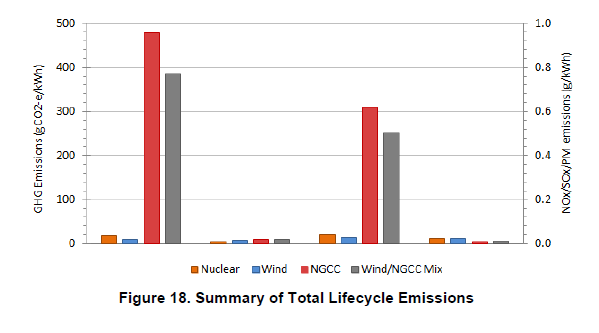If we are serious about carbon free electricity – there must be more nuclear power
While many will write about this most recent IPCC report, we want to bring some new perspective and once again discuss the role of nuclear power as an essential tool to reduce carbon emissions. There are a few new studies and announcements this past month that show the paradox of current policies.
First there was a study released in Nature that suggests that even though natural gas emits about half the carbon of coal, abundant natural gas alone will do little to slow climate change. The study’s lead author Haewon McJeon, an economist at the US Department of Energy’s Pacific Northwest National Laboratory said, “Global deployment of advanced natural gas production technology could double or triple the global natural gas production by 2050, but greenhouse gas emissions will continue to grow in the absence of climate policies that promote lower carbon energy sources.” This is in contrast to many who believe that gas is an important part of the solution. We have no issue with gas and believe it can be an important part of a diversified electricity system; but according to this study, it is not a great tool in the fight against climate change.
Of even more relevance to the discussion, a recent report issued by Hatch Ltd. in Canada,”Lifecycle Assessment Literature Review of Nuclear, Wind and Natural Gas Power Generation”, demonstrates the challenges of relying too much on wind to drive down emissions. This report notes that wind as an intermittent resource is usually backed up by gas. So if wind generally operates about 20% of the time, the gas backup would be operating the other 80% continuing to emit carbon. Therefore nuclear emits some 20 times less carbon than a wind/gas combination (see figure below). Most of us in the energy industry know this is why gas producers are often strong supporters of wind and solar. While the public believe wind is good for the environment; it’s even better for the gas industry.
Even the wind industry acknowledges these results. They note this is only one scenario and that there are more plausible scenarios where wind would be supported by demand side management, storage and other means of clean generation. This is indeed a laudable goal for the future, but the reality remains, today most renewables are backed up by gas.
All of the above would suggest that there should be more support for nuclear as a very important element for a solution to climate change. It is effective and available today and most of all can provide large amounts of clean reliable electricity.
In fact, the public is quite aware of this. A just released study in the USA is showing eighty-two percent of those surveyed agree with the statement, “We should take advantage of all low-carbon energy sources, including nuclear, hydro and renewable energy, to produce the electricity we need while limiting greenhouse gas emissions.” Further 75 percent of those polled said nuclear energy will be “very important” or “somewhat important” in meeting America’s future electricity needs. Seventy-three percent of those surveyed associate nuclear energy with clean air. Clearly a very important step in securing the support required to increase the use of nuclear energy.
On the other hand, we have also seen more negative political views. In Sweden, after reconfirming the need for more nuclear power in 2009; the outcome of the most recent election had the new government stepping back in order to gain support from the Greens. Social Democrat leader Stefan Lofven said “Sweden has very good potential to expand renewable energy through our good access to water, wind and forests. In time, Sweden will have an energy system with 100% renewable energy.” Reality clearly has no place in politics.
And of even more concern is the recent vote by the French parliament to reduce the use of nuclear energy from 75% to no more than 50% by 2025. They must remove a plant from service when Flamanville comes into service in the next year or so as the amount of nuclear power cannot increase. And it looks like the French president himself will take the decision on which plant to shut down. Taking safe clean reliable power out of service prior to its end of life purely as policy seems foolish at best. The Hatch study shows this strategy will most likely lead to increased use of fossil fuels and thus higher carbon emissions at least in the short to medium term. This is exactly what we have seen in Germany. Taking a large amount of nuclear out of service is requiring the construction of new coal generation even though Germany is expanding renewable generation at a very high rate.
So what does this all mean? As we have said many times before, removing and / or reducing nuclear strictly for policy reasons, especially in the case of successfully operating units means only one thing – that there remains an overriding societal belief that nuclear is not safe – and therefore less is always better than more. While some environmentalists now realize this is not the case; this truth has not yet caught up with the public at large and hence is not always supported by their politicians.
The IPCC report is clear that the world must take action to combat climate change. Nuclear power is the only large scale source of clean abundant reliable electricity generation available and that should make it an essential part of the solution. Trying to generate all electricity with zero carbon emissions without making extensive use of nuclear power is simply making what is already very difficult, pretty much impossible.






4 Comments
rennie caplan · November 7, 2014 at 12:53 pm
i found it very interesting
good work
Jeff Walther · November 7, 2014 at 3:03 pm
“eighty-two percent of those surveyed agree with the statement, “We should take advantage of all low-carbon energy sources, including nuclear, hydro and renewable energy, “”
I would find this poll more convincing if there were not four items listed to agree wtih. Folks who oppose nuclear energy might still agree with this statement, because “renewable energy” is mentioned and they would not wnat to be seen as opposeing renewable energy.
I want to believe that this poll demonstrates broad support for nuclear, but I think an honest assessment of how humans respond to mixed questions of this sort leads to the conclusion that this poll actually tells us almost nothing about how folks feel about nuclear energy.
Simon Mitchell · November 9, 2014 at 7:13 pm
Hi Milt – as always an interesting discussion on the recent state of play. All I need to do is read your blog every now and then to keep up with the latest!
A couple of things: in your ‘figure 18’, presumably from the Hatch study, there is several clusters of results but it is not clear what each cluster represents.
Also, it seems to me that we have a situation where:
1. an army of scientists puts together the IPCC report on the climate change component
2. an army of scientists puts together the UNSCEAR report on Fukushima (among others)
And each of these serves as a benchmark in their respective fields but what is missing is a similar degree of effort to generate a benchmark report on the response to the IPCC findings, especially in light of the report from UNSCEAR on the relatively benign outcomes from the Fukushima incident. In my view the public is ill equipped to understand the implications of their decisions in the realm of energy politics because the discourse in the energy sector lacks independence and balance – there is always a vested interest and the Greens globally have been very effective at scaring the hell out of the average person re nuclear.
David Mackay made a valiant one-man effort with his “sustainable energy without the hot air”,
http://www.withouthotair.com/
but we almost need something along these lines as an international collaborative effort which seeks to put up several potential pathways forward – and not all paths will be suitable for all countries.
Cheers
Simon
rod carrow · November 11, 2014 at 1:19 am
I’m an average citizen with an interest in future energy sources. In this context, I offer the following:
1. I think the major challenge facing the nuclear energy industry, as well as other sources (wind, hydro) is to gain social licence. Clearly nuclear doesn’t have the social licence it needs if it is to grow.- and hydro and wind are having trouble as well.
2. By entering into comparisons with gas, wind and hydro, you are avoiding the major issues that lie behind the weak social licence. For example the report of 82% of people favoring nuclear, hydro and renewable energy is not an unqualified endorsement of nuclear. It’s a messy question and the answer is of little value.
3. Unfortunately your article avoided two factors that are responsible for the weak social support, and consequently uncertain political support. They are: nuclear accidents (Three Mile Island, Chernobyl, and Fukushima); and the issue of disposal of nuclear waste. Both of these issues deserve comprehensive response from the industry, disclosing the root causes, and explaining how they are developing solutions that will be publicly acceptable. I find it hard to believe how silent the industry has been on these issues
Unless this conversation takes place, it’s unlikely that nuclear will gain the public and political support it needs. Too bad, because I believe nuclear can and should be the keystone of our energy future.
Rod
Comments are closed.